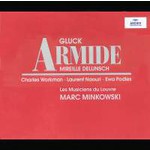
Gluck: Armide (complete opera)
 $49.00
Special Order
$49.00
Special Order3 - 6 weeks add to cart
GLUCK
Gluck: Armide (complete opera)
Mireille Delunsch, Charles Workman, Laurent Naouri, Ewa Podles / Musiciens du Louvre, Marc Minkowski
[ Deutsche Grammophon Archiv / 2 CD ]
Release Date: Wednesday 20 July 2016
This item is only available to us via Special Order. We should be able to get it to you in 3 - 6 weeks from when you order it.
"'Perhaps the best of all my works', said Gluck of his Armide. But this, the fifth of his seven 'reform operas', has never captured the public interest as have Orfeo, Alceste, the two Iphigénies and even Paride ed Elena. Its plot is thinnish, concerned only with the love of the pagan sorceress Armide, princess of Damascus, for the Christian knight and hero Renaud, and his enchantment, disenchantment and finally his abandonment of her. But Armide has two features that set it apart.
One is the extraordinary soft, sensuous tone of the music; Gluck said that it was meant 'to produce a voluptuous sensation', and that if he were to suffer damnation it would be for the passionate love duet in Act 5. Certainly his orchestral writing here has a warmth, a colour and a richness going far beyond anything in his other reform operas (apart from parts of Paride edElena). Second, there are several great solo dramatic scenes, two of them for Armide.
The success of Armide, then, depends critically on the Armide herself. Here it goes to Mireille Delunsch, who brings to it a good deal of intensity but doesn't have command of a wide range of tone, and doesn't seem to make much use of her words. There's some graceful singing in the softer music and the scene where she can't bring herself to kill Renaud is finely done, though ultimately perhaps her singing lacks real emotional tension.
Renaud is sung by Charles Workman, in a strong tenor, sounding almost baritonal at times, but then singing the sleep song, 'Plus j'observe ces lieux', with soft, sweet tone and much delicacy.
The lovers' duet in Act 5 is sung gently and with much charm. Among the other singers, Ewa Podles makes a strong impression as Hate with her large and steady voice. And Laurent Naouri shows a pleasant, firm baritone as Hidraot.
Minkowski makes much of the score's colour and flow. He uses a substantial orchestra, which plays lightly and flexibly and with rhythmic spring. He has a tendency towards quickish tempos here and there but is always attentive to the characterisation of individual numbers." (Gramophone)